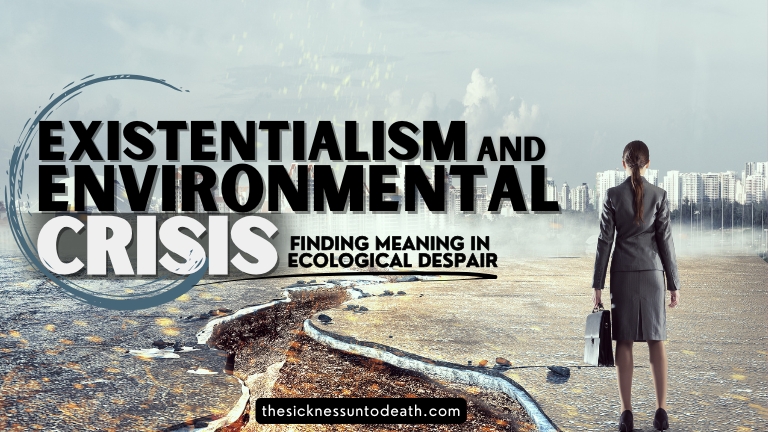In an age marked by mounting ecological crises, from climate change to rampant habitat destruction, a profound sense of despair often shadows our daily lives. This environmental grief, while deeply troubling, can also be transformative. Søren Kierkegaard, a 19th-century Danish philosopher, provides a valuable existential framework for grappling with this despair. His insights into the human condition offer not only a deeper understanding of ecological despair but also pathways toward meaningful action in the face of such overwhelming challenges.
Kierkegaard’s View on Existential Despair
Kierkegaard’s concept of existential despair explores the feelings of emptiness and meaninglessness that arise when there is a perceived disconnection between one’s ideals and the reality of their existence. In the context of environmental issues, this despair can manifest as a sense of powerlessness or frustration over the apparent futility of individual efforts against the vastness of ecological degradation.
Understanding Ecological Despair
Today, ecological despair is often fueled by daily reports of environmental catastrophes and a palpable sense of urgency that demands immediate action yet confronts bureaucratic inertia and societal indifference. This form of despair reflects a crisis of meaning and a yearning for authenticity in our relationship with the natural world. Kierkegaard’s philosophy suggests that confronting this despair is not only inevitable but essential for personal growth and authentic existence.
Navigating Despair Through Kierkegaard’s Lens
- Acknowledgement of Despair: The first step in using Kierkegaard’s framework to navigate ecological despair is acknowledging its existence. Recognising one’s feelings of despair is crucial to understanding the depth of one’s values and concerns about the environment.
- Commitment to Personal Values: Kierkegaard emphasised the importance of living in accordance with one’s values as a cornerstone of authentic existence. In the face of an ecological crisis, this means aligning one’s actions with environmental values, even if those actions seem small or symbolic. Whether it’s reducing waste, advocating for policy changes, or supporting sustainable businesses, these actions affirm one’s commitment to environmental stewardship.
- Finding Solace in Action: While acknowledging despair, Kierkegaard also argued for the transformative potential of taking action. Involvement in environmental causes can mitigate feelings of helplessness by channelling despair into purposeful action. Engaging in community clean-ups, participating in conservation efforts, and educating others about environmental issues are ways to find meaning and assert control over the impending sense of doom.
- Building Community Connections: Kierkegaard noted the importance of individual choice and responsibility, but he also recognised the value of community. In dealing with ecological despair, forging connections with like-minded individuals or groups can provide emotional support and amplify collective impact, making the challenge more manageable and less isolating.
- Sustaining Hope Amid Despair: Finally, Kierkegaard teaches us about the sustaining power of hope. In the environmental context, hope does not entail naive optimism but a resilient determination fueled by the belief in the worthiness of our efforts, regardless of their immediate impact.
Applying Kierkegaard’s existential framework to the environmental crisis encourages a proactive and reflective approach to ecological despair. It compels us to examine our values, make conscious choices, and engage actively with our communities. By doing so, we transform our despair into a catalyst for meaningful change, reaffirming our commitment to the planet and each other. In embracing this existential challenge, we not only confront our despair but also discover a deeper, more enduring sense of purpose in our fight for a sustainable future.

